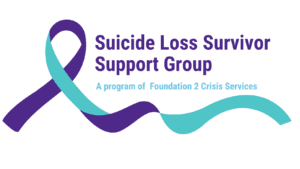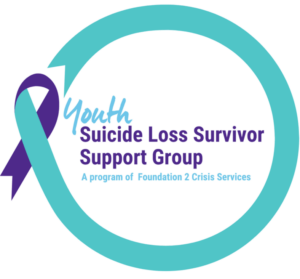Suicide Loss Survivor Support Group
If you have lost someone to suicide, we want you to know that you aren’t alone. There are millions of suicide loss survivors like you who are trying to cope with this heartbreaking loss. We are here to support you and your loved ones as you navigate this loss. Our services are free, confidential and completely voluntary.
A suicide loss survivor is someone who has lost a loved one to suicide. It can be anyone in your life, including a parent, sibling, friend, spouse or child. Our support groups are open to anyone who has experienced a loss by suicide, regardless of how long ago it happened. There is no timeline on grief.
Losing a loved one to suicide is a traumatic experience. Emotional reactions are often complex, and people may find that they are experiencing a bewildering range of feelings including guilt, anger, shame, rejection, sadness, and fear. If you have lost a loved one to suicide, you don’t have to grieve alone.
We offer a youth and an adult support group – safe, supportive places to share and connect with others who have lost a friend or family member to suicide.
The adult Suicide Loss Survivor Support Group gathers twice a month at Foundation 2 Crisis Services. You are welcome to attend every time, or at any interval that works for you. It is always free to attend. The adult group is for individuals ages 18+.
The group meets:
6-7:30 p.m.
2nd and 4th Tuesday of the month (year-round)
305 2nd Ave. SE
Cedar Rapids, IA 52401
First floor training room space

You can also attend the group virtually and join the group’s private Facebook page. Contact us at info@foundation2.org to get connected.
Sherri’s Story
“Suicide brought a lot of complex emotions that were difficult to talk about with friends and even family members. We each had a different relationship with my dad and different emotions around the loss. Being able to sit with the complex rollercoaster of emotions with others that ‘get it’ – and to have my feelings validated, not judged – has been an important part of my healing process.
We have said it’s the ‘best group you never wanted to be a part of.’ But if you have experienced loss by suicide, this group can provide an incredible sense of support, community, healing and hope.”
What are support groups all about?
At the Suicide Loss Survivor Support Group, you can find:
- Listening: Share feelings and explore painful questions in a supportive environment. Members also share coping techniques.
- Reassurance: Know you are not suffering alone, and that your reactions, thoughts and feelings are not unusual.
- Opportunity: Reaching out, even in the midst of your own pain, to help others in a similar situation can be a healing experience in itself.
- Information: Learn the facts and suicide, grief and depression.
Are my feelings normal?
To be at peace with the deceased, survivors must grieve. Aside from the typical aspects of grief, as a suicide survivor, you may be experiencing:
- Stigma: Other people—sometimes even your relatives and friends—may avoid you or even blame you for the death. You might feel ashamed that such a thing happened in your family.
- Guilt: Because suicide has been called “the preventable death,” you may think you could have kept it from happening.
- Rejection: You may feel abandoned, reasoning that, because your loved one chose death, he or she chose not to live with you.
- Anger: Your pain can take the form of anger toward the deceased, toward professionals for not preventing it, toward yourself, or even toward God.
- Questioning: Survivors can be overwhelmed wondering why the person took his or her life. You may wonder what you could have done to prevent it.
 We are currently forming the next Youth Suicide Loss Survivor Support Group. To join or learn more, please reach out to skalkbrenner@foundation2.org or 319-774-5497.
We are currently forming the next Youth Suicide Loss Survivor Support Group. To join or learn more, please reach out to skalkbrenner@foundation2.org or 319-774-5497.
Our free 8-week grief support group provides a safe space for teens (ages 13-17) to connect with others who understand their pain. Guided by trained counselors, participants receive emotional and therapeutic support while learning healthy ways to manage stress, explore creative coping skills, and find strength in a community of peers who have experienced similar losses.
Support group meetings are held every other Monday from 6-7:30 p.m. at Foundation 2 Crisis Services. We use a cohort model for 8 weeks to provide a higher level of support and consistency.
Once a session starts, we request that you wait until the start of the next session to get involved. For emergency needs, please reach out to our crisis line at 319-362-2174. It’s free and confidential.
Prior registration is requested. There is no cost.
The group meets:
6-7:30 p.m.
Every other Monday
305 2nd Ave. SE
Cedar Rapids, IA 52401
First floor training room space
Contact
To sign up for an 8-week session, contact Simon Kalkbrenner at skalkbrenner@foundation2.org or 319-774-5497.
What are support groups all about?
At the Suicide Loss Survivor Support Group, you can find:
- Listening: Share feelings and explore painful questions in a supportive environment. Members also share coping techniques.
- Reassurance: Know you are not suffering alone, and that your reactions, thoughts and feelings are not unusual.
- Opportunity: Reaching out, even in the midst of your own pain, to help others in a similar situation can be a healing experience in itself.
- Information: Learn the facts and suicide, grief and depression.
Are my feelings normal?
To be at peace with the deceased, survivors must grieve. Aside from the typical aspects of grief, as a suicide survivor, you may be experiencing:
- Stigma: Other people—sometimes even your relatives and friends—may avoid you or even blame you for the death. You might feel ashamed that such a thing happened in your family.
- Guilt: Because suicide has been called “the preventable death,” you may think you could have kept it from happening.
- Rejection: You may feel abandoned, reasoning that, because your loved one chose death, he or she chose not to live with you.
- Anger: Your pain can take the form of anger toward the deceased, toward professionals for not preventing it, toward yourself, or even toward God.
- Questioning: Survivors can be overwhelmed wondering why the person took his or her life. You may wonder what you could have done to prevent it.

Our Support Groups are part of CORES, the Center of Response, Education & Support. The CORES initiative is grounded in trauma-informed care and backed by decades of crisis response experience to provide practical, real-world strategies for mental wellness. Learn about CORES here.
